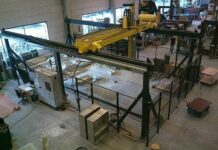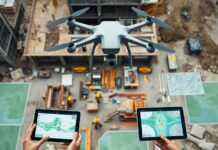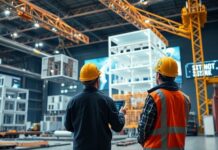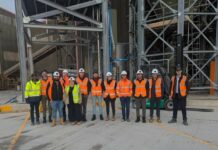In the dynamic landscape of today pertaining to construction management, wherein the efficiency as well as innovation happen to be paramount, integration when it comes to artificial intelligence- AI is indeed revolutionizing traditional construction practices by way of offering novel solutions, making designs powerful, streamlining decision-making processes, and thereby playing the role of a game-changer.
Apparently, the construction industry, which happened to be formerly touted as well as traditionally characterized as complex processes with fragmented communication, is all of a sudden changing for the better with the advent of AI and BIM and is poised for a revolutionary transformation.
At the forefront of the AI revolution, just a few sectors stand as majorly poised for transformation as construction management. With its massive scale along with economic significance, the construction industry happens to be witnessing a paradigm shift, pushed by advancements within AI and ML. This revolution is not just about embracing new technologies; it is also about fundamentally editing how one goes on to plan, execute, as well as manage construction projects.
As per one of the recent reports by McKinsey, the construction sector happens to be earmarked to be over $10 trillion a year, which is equivalent to 13% of the global GDP. And only by digitization as well as automation can market capitalization get raised by a phenomenal $1.6 trillion per year, thereby making the construction industry one of the largest in the world economy.
Right from predictive analytics to robotics process automation- RPA, AI happens to be reshaping every shape of construction management, thereby paving the way for upgraded efficiency, productivity, and risk mitigation. Through leveraging the AI metrics teamed with IoT devices, construction management firms can go on to efficiently and effectively anticipate equipment breakdowns as well as address issues, thereby resulting in significant time along with cost savings.
AI and ML’s role in construction solutions
AI as well as ML technologies happen to be further aiding in revolutionizing construction management by way of providing actionable insights and, at the same time, optimizing processes at each stage of the project lifecycle. Right from conceptualization along with designing layouts to construction as well as maintenance, AI-powered solutions are indeed streamlining operations and improving decision-making. For example, AI algorithms can go on to evaluate massive amounts of data so as to optimize project schedules, place resources efficiently, and at the same time identify potential risks before they go on to escalate. The models can go on to learn from historical project data so as to predict project outcomes, thereby helping the stakeholders come up with informed decisions as well as mitigate delays and cost overruns.
Building information modelling- BIM
BIM happens to be at the core of AI-driven construction management. BIM goes on to leverage AI as well as ML algorithms in order to create digital representations in terms of physical assets, thereby enabling stakeholders to go ahead and visualize, simulate, and evaluate construction projects and that too in a virtual environment. By way of centralizing project data as well as facilitating collaboration within the stakeholders, BIM goes on to upgrade coordination, decrease rework, and improve the project outcomes. AI-powered BIM solutions can go ahead and automate clash detection, make sure to optimize building designs to avail energy efficiency, and at the same time simulate construction sequences, revolutionizing the way construction projects happen to be planned and executed.
Robotics process automation- RPA role
RPA happens to be yet another transformative technology that has been making waves in construction management. By way of automating repetitive as well as rule-based tasks, RPA goes on to free-up valuable time when it comes to construction professionals so as to focus on more strategic tasks. When it comes to construction management, RPA can go ahead and automate procurement processes, processing of invoice and documentation management, thereby reducing errors as well as speeding up project timelines. By way of seamlessly integrating with the existing systems as well as software, RPA goes on to upgrade operational efficiency and also drive cost savings throughout the construction projects.
Risk mitigation as well as predictive analytics due to AI
It is well to be noted that one of the major advantages of AI within the construction management happens to be its ability to reduce risks as well as uncertainties. By evaluating historical project data as well as real-time sensor data, AI algorithms can go on to identify potential risks and, at the same time, predict their likelihood along with their impact when it comes to project outcomes. Right from weather-related postponements and delays to disruptions in the supply chain, AI-powered predictive analytics help stakeholders proactively address risks as well as implement mitigation strategies. By way of leveraging AI-driven risk management solutions, construction companies can go on to minimize project delays, decrease costs, and also upgrade stakeholder confidence.
According to yet another finding by McKinsey, the execution when it comes to predictive maintenance strategies can go on to further decrease the machine downtime by 30-50% and, at the same time, increase its lifespan by 20-40%.
Barriers
As one stands on the cusp of an AI shift, even though opportunities happen to be immense and the potential when it comes to innovation is indeed boundless, they happen to be still surrounded by barriers such as data interoperability, standardization, as well as workforce adaptation that need to be taken care of and fought along the journey so as to have a smooth but rapid growth path.
Road Forward
As the role of AI continues to advance, the gamut of construction management will only rise in significance. Right from autonomous construction vehicles to augmented reality-enhanced project visualization, possibilities happen to be limitless.
But the fact is that realizing the full potential when it comes to AI in construction management requires a collaborative effort from all stakeholders. Construction companies must go on to invest in AI talent, infrastructure, as well as training so as to effectively integrate AI across their operations. Governments as well as regulatory bodies must go on to establish frameworks along with benchmarks so as to ensure ethical and also a responsible use of AI within the construction sector. By way of embracing AI-driven innovation, the construction sector can go ahead and unlock new levels in terms of efficiency, sustainability, as well as resilience, hence shaping cities and also tomorrow’s infrastructure.



























